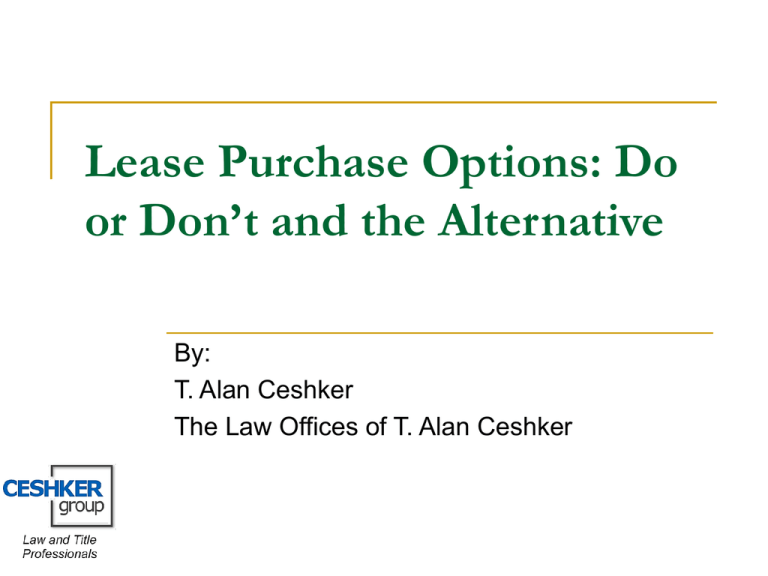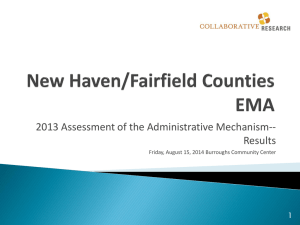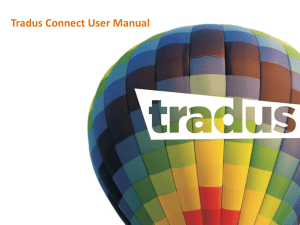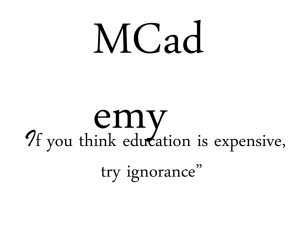
Lease Purchase Options: Do
or Don’t and the Alternative
By:
T. Alan Ceshker
The Law Offices of T. Alan Ceshker
T. Alan Ceshker
Attorney with the Law Offices of T. Alan Ceshker
JD 1991 – University of Texas School of Law
Specialize in Real Estate and Construction Law.
Assists Investors with Creative Financing Alternatives.
Handles both the drafting of real estate documents and litigation
regarding real estate transactions.
22 years of un-screwing people.
Owner: Independence Title Company – Ceshker Group
Disclaimer
This presentation has been prepared by the Law Offices of T. Alan
Ceshker for informational purposes only and is not legal advice,
does not necessarily reflect the opinions of The Law Offices of T.
Alan Ceshker or any of its attorneys or clients, and is not guaranteed
to be correct, complete, or up-to-date. This presentation is not
intended to create, and access to or receipt of information included
in this presentation does not constitute, a lawyer/client relationship.
No one should act upon this information without seeking
professional counsel.
This presentation was created by the Law Offices of T. Alan Ceshker
and, except as otherwise indicated, is © 2007-2013 by the Law
Offices of T. Alan Ceshker. All rights are reserved.
Translation:
I am not your lawyer at this time.
This stuff could be wrong.
More accurately, the laws may have changed after
this presentation. Always hire legal counsel
regarding any investor related questions.
Don’t steal my stuff.
Lease Purchase Options: Overview
In 2005 the Legislature decided to protect
consumers from the unscrupulous individuals who
were taking advantage of aspiring home owners via
lease purchase option agreements.
Sellers were taking great advantage of low end
buyers.
Now – the law provides for immense protection of
buyers.
Lease Purchase Options: The Law
Chapter 5, Subchapter D Sec. 5.061 et seq. of the
Texas Property Code governs lease purchase
options.
Definition of Lease purchase option: An option to
purchase real property that includes or is combined
or executed concurrently with a residential lease
agreement, together with the lease, is considered an
executory contract for conveyance of real property
and subject to the rules of this subchapter
§5.062(a)(2).
Translation:
A lease agreement and a purchase option
regarding the same property signed at the
same time is now regulated by the statute.
This includes a contract for deed.
Applicability
This Chapter applies to all properties that are
to be used as the purchaser’s residence.
By definition, a lot measuring one acre or less is
presumed to be residential property.
Major Exceptions:
The statute does not apply to commercial
transactions
The statute does not apply to an executory
contract that provides for the delivery of a
deed from the seller to the purchaser within
180 days of the date of the final execution of
the executory contract §5.062(c).
Translation
You can do a lease purchase option for 179
days or less and not have to comply with
§5.061 et seq.
No – a month to month or renewing agreement
will not work.
No – a verbal agreement will not work.
No – your revolutionary idea does not work.
Some of the Pitfalls
Seller must provide a survey which is no older than a year;
Seller must provide copies of liens, restrictive covenants, and
easements affecting the property;
Buyer may cancel the contract for any reason within 14 days of signing;
Excessive late fees are banned;
Seller must provide an annual accounting statement;
Buyer has a 30 day unconditional right to cure any default;
If a seller is liable to a purchaser under this subchapter, the purchaser,
without taking judicial action, may deduct the amount owed to the
purchaser by the seller from any amounts owed to the seller by the
purchaser under the terms of an executory contract; and
Any violation is a Deceptive Trade and Practices Act violation
A violation entitles the purchaser to cancel and rescind the executory
contract and receive a full refund of all payments made to the seller.
More Problems
The purchaser can obtain title by delivering a
promissory note that is equal in amount to the
balance of the total amount owed by the
purchaser to the seller.
The seller must then convey the property to
the purchaser.
“The” Problem
A seller may not, under any circumstances,
enter into a lease purchase option agreement
with a purchaser if the seller does not own
the property free and clear §5.085(a).
The Exception - Not
This subsection does not apply to a lien or
encumbrance placed on the property that
does not prohibit the property from being
encumbered by an executory contract – i.e. a
loan that does not have a due on sale clause.
The Clincher
If you violate the statute, the purchaser may cancel
and rescind the executory contract and receive from
the seller:
the return of all payments of any kind made to the seller
under the contract; and
reimbursement for:
any payments the purchaser made to a taxing authority for the
property; and
the value of any improvements made to the property by the
purchaser.
The Bottom Line
Lease purchase options are allowed but NOT
a viable option
The Solution: Mortgage Wraps
Definition: The seller financing of a property
that does not pay off the current mortgage
lien on the property.
The property is conveyed and the existing
mortgage lien stays in place with a second,
junior lien held by the seller.
Two Types of Seller Finance
Transactions
Underlying Loan
No Underlying Loan
Mortgage Wrap
Subject to
Assumption
Used in
Assignment
transactions
Terminology
Subject to: Used when the buyer is purchasing and
the seller is no longer involved and has no equity
interest in the property.
I.e. the seller is not owed funds under a promissory note.
Assumption: the buyer is assuming the underlying
loan with the permission of the lender.
Mortgage Wrap: the seller is carrying a promissory
note in which the payment is above the underlying
loan payment.
Also commonly used to refer to all seller finance
transactions with underlying liens remaining.
Preliminary Concerns Regarding
Wraps
SAFE Act
T-SAFE Act
Dodd-Frank Act
These Acts prohibit a lender/seller from taking applications
and negotiating terms of a new note unless they are a
licensed residential mortgage loan originator.
If not licensed, the lender-seller must utilize the services of
individuals who are licensed or an attorney.
De Minimus Exceptions
SAFE Act and T-SAFE Act
An individual who engages in no more than 5
mortgage loans in a rolling 12 month period is
exempt.
Dodd-Frank Act
Property owners who offer seller financing for 3
properties or less in a rolling 12 month period are
exempt from being licensed as a loan officer.
The Exemption to the De Minimus
Exception of the Dodd Frank Act
Must still comply with:
1. The seller did not construct the home to which
the financing is being applied;
2. The loan is fully amortizing (no balloon
mortgages allowed);
3. The seller determines in good faith and
documents that the buyer has a reasonable ability
to repay the loan;
4. The loan has a fixed rate or is adjustable only
after 5 or more years, subject to reasonable
annual and lifetime caps.
Due on Sale Clause
This is a non-issue
The most talked about topic of a mortgage wrap.
The most infrequently occurring issue in real life
transactions.
See me after if you wish to enter into law school
geek discussions about hypotheticals.
How to do a Mortgage Wrap
Use the TREC 1 to 4 contract and choose Seller
Financing in Paragraph 4 C.
Use the Seller Finance Addendum for Mortgage
Wraps (Form 26-6).
Use the Loan Assumption Addendum for Subject to
transactions (Form 41-2).
Use a wrap around addendum for special
circumstances.
Receipt the contract with a attorney/title office.
Purchase title insurance.
The rest runs like a normal transaction – sort of.
Major Concern: Home Owner’s
Insurance
The buyer must purchase new insurance.
The seller need not maintain insurance.
The seller must be listed as an “additional
interest”.
The lender must be listed in the “mortgagee’s
clause”.
The insurance agent must be familiar with
mortgage wrap insurance.
Failure to get the insurance in place is the most
common reason for a mortgage wrap to fail.
Loan Servicing
Use a loan servicing company familiar with
mortgage wraps.
Often if the buyer is an investor and re-selling
via a mortgage wrap, the seller and end
buyer do not require a loan servicer.
5.016 Notice
Texas Property Code requires a notice be
provided to the buyer of a property if
encumbered by a recorded lien.
Provides information about the loan, taxes,
insurance
Not needed if you purchase title insurance.
Provide the notice regardless.
Closing Documents Required
If you have a Mortgage Wrap, need the full
set – i.e. DOT, Promissory Note, Warranty
Deed with Vendor’s Lien, Disclosures.
If you have a Subject to, a full set is not
required.
Use a full set regardless.
You do not want to appear later that you took
advantage of a seller or buyer.
Costs
You can get some forms from an attorney out of
Waco for $150.00 and do it yourself.
You can go to a title company and they get some
forms from their in-house attorney or their go-to
attorney for $300 to $750.
Please take my business card if choosing this option for
future litigation representation.
Probably safe on 3 out of 10 wrap transactions.
Use a fee title office with an active attorney
specializing in mortgage wraps. The cost ranges
from $750 to $4,000 plus.
The End of a Mortgage Wrap
The Buyer will either sell the property or
refinance and payoff the underlying loan.
I advise parties to try and keep the term of
the wrap as short as possible – i.e. 2 to 5
years.
Questions?










